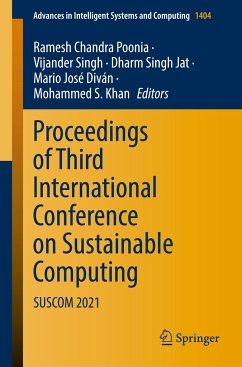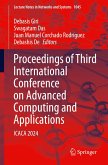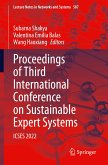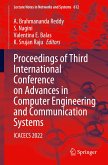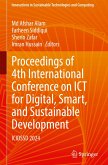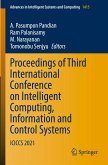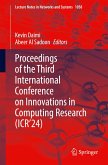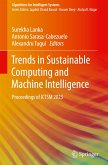Proceedings of Third International Conference on Sustainable Computing
SUSCOM 2021
Herausgegeben:Poonia, Ramesh Chandra; Singh, Vijander; Singh Jat, Dharm; Diván, Mario José; Khan, Mohammed S.
Proceedings of Third International Conference on Sustainable Computing
SUSCOM 2021
Herausgegeben:Poonia, Ramesh Chandra; Singh, Vijander; Singh Jat, Dharm; Diván, Mario José; Khan, Mohammed S.
- Broschiertes Buch
- Merkliste
- Auf die Merkliste
- Bewerten Bewerten
- Teilen
- Produkt teilen
- Produkterinnerung
- Produkterinnerung
The book includes a selection of the best papers presented at the Third International Conference on Sustainable Computing (SUSCOM 2021), held in Jaipur, India, during 19 - 20 March 2021. It covers topics like Internet of things (IoT); artificial system of security; smart storage and knowledge retrieval using data cloud; intelligent transport management; intelligent cognitive and bio-inspired computing and management science. The book is useful for peoples from academia, government bodies, healthcare and industry to discuss their future scope.
Andere Kunden interessierten sich auch für
![Proceedings of Third International Conference on Advanced Computing and Applications Proceedings of Third International Conference on Advanced Computing and Applications]() Proceedings of Third International Conference on Advanced Computing and Applications155,99 €
Proceedings of Third International Conference on Advanced Computing and Applications155,99 €![Proceedings of Third International Conference on Sustainable Expert Systems Proceedings of Third International Conference on Sustainable Expert Systems]() Proceedings of Third International Conference on Sustainable Expert Systems193,99 €
Proceedings of Third International Conference on Sustainable Expert Systems193,99 €![Proceedings of Third International Conference on Advances in Computer Engineering and Communication Systems Proceedings of Third International Conference on Advances in Computer Engineering and Communication Systems]() Proceedings of Third International Conference on Advances in Computer Engineering and Communication Systems177,99 €
Proceedings of Third International Conference on Advances in Computer Engineering and Communication Systems177,99 €![Proceedings of 4th International Conference on ICT for Digital, Smart, and Sustainable Development Proceedings of 4th International Conference on ICT for Digital, Smart, and Sustainable Development]() Proceedings of 4th International Conference on ICT for Digital, Smart, and Sustainable Development217,99 €
Proceedings of 4th International Conference on ICT for Digital, Smart, and Sustainable Development217,99 €![Proceedings of Third International Conference on Intelligent Computing, Information and Control Systems Proceedings of Third International Conference on Intelligent Computing, Information and Control Systems]() Proceedings of Third International Conference on Intelligent Computing, Information and Control Systems216,99 €
Proceedings of Third International Conference on Intelligent Computing, Information and Control Systems216,99 €![Proceedings of the Third International Conference on Innovations in Computing Research (ICR'24) Proceedings of the Third International Conference on Innovations in Computing Research (ICR'24)]() Proceedings of the Third International Conference on Innovations in Computing Research (ICR'24)171,99 €
Proceedings of the Third International Conference on Innovations in Computing Research (ICR'24)171,99 €![Trends in Sustainable Computing and Machine Intelligence Trends in Sustainable Computing and Machine Intelligence]() Trends in Sustainable Computing and Machine Intelligence186,99 €
Trends in Sustainable Computing and Machine Intelligence186,99 €-
-
-
The book includes a selection of the best papers presented at the Third International Conference on Sustainable Computing (SUSCOM 2021), held in Jaipur, India, during 19 - 20 March 2021. It covers topics like Internet of things (IoT); artificial system of security; smart storage and knowledge retrieval using data cloud; intelligent transport management; intelligent cognitive and bio-inspired computing and management science. The book is useful for peoples from academia, government bodies, healthcare and industry to discuss their future scope.
Produktdetails
- Produktdetails
- Advances in Intelligent Systems and Computing 1404
- Verlag: Springer / Springer Nature Singapore / Springer, Berlin
- Artikelnr. des Verlages: 978-981-16-4537-2
- 1st ed. 2022
- Seitenzahl: 620
- Erscheinungstermin: 5. Januar 2022
- Englisch
- Abmessung: 235mm x 155mm x 34mm
- Gewicht: 925g
- ISBN-13: 9789811645372
- ISBN-10: 981164537X
- Artikelnr.: 62103730
- Herstellerkennzeichnung Die Herstellerinformationen sind derzeit nicht verfügbar.
- Advances in Intelligent Systems and Computing 1404
- Verlag: Springer / Springer Nature Singapore / Springer, Berlin
- Artikelnr. des Verlages: 978-981-16-4537-2
- 1st ed. 2022
- Seitenzahl: 620
- Erscheinungstermin: 5. Januar 2022
- Englisch
- Abmessung: 235mm x 155mm x 34mm
- Gewicht: 925g
- ISBN-13: 9789811645372
- ISBN-10: 981164537X
- Artikelnr.: 62103730
- Herstellerkennzeichnung Die Herstellerinformationen sind derzeit nicht verfügbar.
Dr. Ramesh Chandra Poonia is an Associate Professor at the Department of Computer Science, CHRIST (Deemed to be University), Bangalore, India. He recently completed his Postdoctoral Fellowship from CPS Lab, Department of ICT and Natural Sciences, Norwegian University of Science and Technology, Ålesund, Norway. He received his PhD degree in Computer Science from Banasthali University, Banasthali, India in July 2013. He is Chief Editor of TARU Journal of Sustainable Technologies and Computing (TJSTC) and Associate Editor of the Journal of Sustainable Computing: Informatics and Systems, Elsevier. He also serves as an editorial board of a few international journals. He is the main author and co-author of 06 books and lead editor of several special issue of journals and books, including Springer, CRC Press - Taylor and Francis, IGI Global and Elsevier, edited books and Springer conference proceedings. He has authored/co-authored over 70 research publications in peer-reviewed reputed journals, book chapters, and conference proceedings. His research interests are Sustainable Technologies, Cyber-Physical Systems, Path Planning & Collision Avoidance in Artificial Intelligence, and Intelligent Algorithms for Autonomous Systems. Dr. Vijander Singh working as an associate professor, Department of Computer Science and Engineering, Manipal University, Jaipur, India. He received Ph.D. degree from Banasthali University, Banasthali, India, in April 2017. He has published around 30 research papers in indexed journals and several book chapters for international publishers. He authored books and edited 2 books, also handled/handling special issues of journals of international repute such as Taylor and Francis, Taru Publication, IGI Global, Inderscienc as a guest editor. He is an associate editor of TARU Journal of Sustainable Technologies and Computing (TJSTC). He has organized several International Conferences, FDPs and Workshops as a core team member of organizing committee. His research area includes machine learning, deep learning, precision agriculture and networking. Prof. Dharm Singh Jat received his Master of Engineering and Ph.D. in Computer Science and Engineering from prestigious universities in India. He is a professor of Computer Science at Namibia University of Science and Technology. He is the author of more than 160 peer-reviewed articles and the author or editor of more than 20 books. His interests span the areas of multimedia communications, wireless technologies, mobile communication systems, edge, roof computing, network security and Internet of things. He has given several guest lecturer at various prestigious conferences. He has been the recipient of more than 19 prestigious awards, such as Eminent Scientist Award, Distinguished Academic Achievement, Eminent Engineering Personality, CSI Chapter Patron and Significant Contribution, Best Faculty Researcher, Best Technical Staff, Outstanding UniversityService, Distinguished ACM and IEEE Computer Society Speaker award. He is a fellow of the Institution of Engineers (I), Computer Society of India and Senior Member IEEE. Mario Diván was born in Santa Rosa (Argentina) on March 10 of 1979. He received an engineering degree in Information Systems from the National Technological University -NTU- (Argentina) in 2003, while he holds a specialty in managerial engineering from the NTU (Argentina) in 2004, a specialty in data mining and knowledge discovery in databases from the University of Buenos Aires (Argentina) in 2007, and a specialty on high-performance and grid computing from the National University of La Plata -NULP- (Argentina) in 2011. He obtained his Ph.D. in Computer Science in 2012 from the NULP (Argentina). He is a full professor from the National University of La Pampa (Argentina), the head of the Data Science Research Group, an honorary professor from Amity Institute of Information Technology (Noida, India)and a visiting professor in many universities. His interest areas lie in data science, data stream, stream mining, high-performance computing, big data, Internet of things and measurement. Dr. Mohammad S. Khan (SM' 19) is currently an assistant professor of Computing at East Tennessee State University and the director of Network Science and Analysis Laboratory (NSAL). He received his M.Sc. and Ph.D. in Computer Science and Computer Engineering from the University of Louisville, Kentucky, USA, in 2011 and 2013, respectively. His primary area of research is in ad hoc networks, wireless sensor networks, network tomography, connected vehicles and vehicular social networks. He currently serves as an associate editor of IEEE Access, IET ITS, IET WSS, Springer's Telecommunication Systems and Neural Computing and Applications. He has been on technical program committees of various international conferences and technical reviewer of various international journals in his field. He is a senior member of IEEE.
Chapter 1. Analysis of Perceived Usability, Satisfaction and Adoption of Biometric Systems in the Public Transportation Sector of U.A.E..- Chapter 2. A Semisupervised Deep Learning-based Approach with Multiphase Active Contour Loss for Left Ventricle Segmentation from CMR Images.- Chapter 3. Survey on Energy Efficient approach for Wireless Multimedia Sensor Network.- Chapter 4. Effectual Accuracy of Ophthalmological Image Retinal Layer Segmentation.- Chapter 5. Performance Assessment of K-Nearest Neighbor Algorithm for Classification of Forest Cover Type.- Chapter 6. Gestational Diabetes Prediction Using Machine Learning Algorithms.- Chapter 7. Design and Implementation of Buffon Needle problem Using Technology for Engineering Students.- Chapter 8. Energy Efficient Multi-hop Cluster Routing Protocol for WSN.- Chapter 9. A Review of Smart Electronic Voting Machine.- Chapter 10. Application of Machine Learning Techniques in Intrusion Detection Systems: A Systematic Review.- Chapter11. Relationship between sustainable practices and firm performance: A study of the FMCG sector in India.- Chapter 12. Learning Paradigms for Analysis of Bank Customer.- Chapter 13. Diagnosis of Dermoscopy Images for the Detection of Skin Lesions Using SVM and KNN.- Chapter 14. MaTop: An Evaluative Topic Model for Marathi.- Chapter 15. Convolutional neural network: an overview and application in image classification.
Chapter 1. Analysis of Perceived Usability, Satisfaction and Adoption of Biometric Systems in the Public Transportation Sector of U.A.E..- Chapter 2. A Semisupervised Deep Learning-based Approach with Multiphase Active Contour Loss for Left Ventricle Segmentation from CMR Images.- Chapter 3. Survey on Energy Efficient approach for Wireless Multimedia Sensor Network.- Chapter 4. Effectual Accuracy of Ophthalmological Image Retinal Layer Segmentation.- Chapter 5. Performance Assessment of K-Nearest Neighbor Algorithm for Classification of Forest Cover Type.- Chapter 6. Gestational Diabetes Prediction Using Machine Learning Algorithms.- Chapter 7. Design and Implementation of Buffon Needle problem Using Technology for Engineering Students.- Chapter 8. Energy Efficient Multi-hop Cluster Routing Protocol for WSN.- Chapter 9. A Review of Smart Electronic Voting Machine.- Chapter 10. Application of Machine Learning Techniques in Intrusion Detection Systems: A Systematic Review.- Chapter11. Relationship between sustainable practices and firm performance: A study of the FMCG sector in India.- Chapter 12. Learning Paradigms for Analysis of Bank Customer.- Chapter 13. Diagnosis of Dermoscopy Images for the Detection of Skin Lesions Using SVM and KNN.- Chapter 14. MaTop: An Evaluative Topic Model for Marathi.- Chapter 15. Convolutional neural network: an overview and application in image classification.

